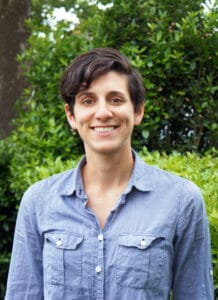Julia Katz, 2017 Health Leader
Title: Healthy Communities Planner
Organization: Katz Planning, Upstream Works Collaborative
Location: Durham, NC
Julia Katz is a freelance consultant working at the intersection of public health and urban planning. She works through policies, systems, and environments to support affordable housing, food systems, economic and educational opportunities, and age-friendly communities. As Chair of the Education, Encouragement, and Engagement Committee on Durham’s Bicycle and Pedestrian Advisory Commission, Julia collaborates on local tactical urbanism projects and active transportation initiatives. Julia holds a Bachelor’s degree from Washington University in St. Louis and Master’s degrees in City and Regional Planning and in Public Health from the University of North Carolina, Chapel Hill.
Prior to founding Katz Planning, Julia worked as a housing and community development planner with Triangle J Council of Governments (TJCOG). She also worked at Active Living by Design, researching how hospitals and health institutions address social determinants of health through multisector partnerships. Before graduate school, Julia worked for nonprofit organizations in her hometown of New York City, including Nontraditional Employment for Women, where she collaborated with tradeswomen, trades unions, and developers to increase retention among tradeswomen.
Why are you motivated to participate in the Health Leaders Network? How will your participation enhance your current and future work?
I was drawn to the ULI Health Leaders Network program because of the networking and educational opportunities it offers in a field that I am passionate about. I am excited to learn from experts in diverse sectors and collaborate with professionals with similar interests. I aim to use planning as a vehicle for improving health outcomes, and the ULI Health Leaders Network program can help me achieve this. Participating in this program will accelerate my professional growth and build my understanding of how to effectively cultivate healthy communities using a social justice lens.
Work at the intersection of planning and public health is continuing to gain momentum. Through the ULI program, I want to develop my leadership skills so I can facilitate further progress in this direction. I expect to advance my communication skills and learn to implement innovative strategies to improve complex problems. This includes learning from land use professionals on how to help preserve neighborhoods where residents might be at risk of involuntary displacement, rehabilitate struggling neighborhoods, and ensure that low-income households can afford to live close to resources that facilitate healthy living. Similarly, I am hoping to complete the ULI program with a better understanding of financing tools and policies that help make difficult projects feasible. This experience will help me address a variety of audiences, including community members, financers, and local decision-makers, to foster mutually beneficial relationships that lead to neighborhood improvements.
